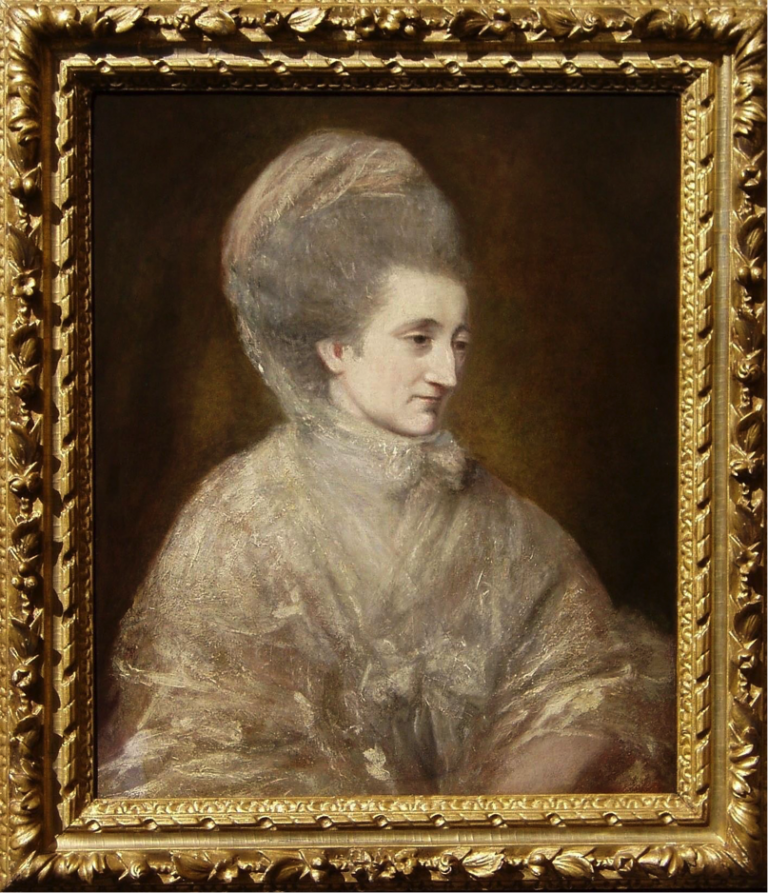Elizabeth Montagu Biography
Go to: Biography | The Portrait | The Bookshelf | Bluestocking Circle | Resources

Find out more about the Portrait
Elizabeth Montagu: A Life in Letters
Dr Elizabeth Eger
Eighteenth-century letter-writing was a highly performative act and allowed for the creation of multiple, parallel selves, each tailored to its recipient. As Montagu wrote to her sister in 1767: ‘I am a Critick, a Coal owner, a Land Steward , a Sociable Creature ...one must write.’ Elizabeth Montagu, christened ‘Queen of the Bluestockings’ by Samuel Johnson, was famous in her lifetime as a Shakespeare critic, salon hostess and champion of women’s writing. She attracted the leading writers, politicians and artists of her day to her sparkling London assemblies, where she placed a new emphasis on conversation as a pleasurable and enlightened pursuit. Her guests included Joshua Reynolds, George, Lord Lyttelton, David and Eva Garrick, William Pulteney, Earl of Bath, Horace Walpole, Edmund Burke, Elizabeth Carter and Samuel Johnson, and later Anna Laetitia Barbauld, Hannah More and Fanny Burney. In her richly decorated London homes, Montagu aimed to bring together sensual and intellectual pleasure, and to allow talents of many kinds to flourish in an atmosphere that was free from the party politics that dominated court culture. Here Montagu nurtured a rising generation of metropolitan intellectuals, writers and artists. She was a public figure within eighteenth-century culture, whose life not only illuminates the history of several important aspects (and locations) of her age but also brings together a number of connected lives. As she wrote in a letter to her fellow bluestocking hostess Mrs Vesey in 1781, ‘We have lived with the wisest, the best, and the most celebrated men of our Times, and with some of the best, most accomplished, most learned Women of any times.’
How did Montagu achieve such a powerful position at the heart of several important networks of the age, with the ability to bestow favour in a regal manner? Her privilege was largely the result of her own incessant energy and social ambition. Born in York on 2nd October 1718 as Elizabeth Robinson, she was nicknamed ‘Fidget’ as a child, in honour of the liveliness of her mind and body. She was the fifth of nine children, and spent a great deal of time with her grandparents as a child. Conyers Middleton, her step-grandfather, was librarian for Cambridge University and created a hub for learned conversation at his home. He would ask the young Elizabeth to observe intellectual interaction and to note down what she had heard, and she thus became aware of conversation as a highly performative and intellectual tool. Through Middleton, who was also Librarian to Edward Harley, Elizabeth Robinson was introduced to the Harley family at Wimpole Hall and began a lifelong correspondence with Margaret Cavendish Harley, later Bentinck. Elizabeth’s wit and energy endeared her to Margaret and their intense friendship deepened further after the latter became Duchess of Portland and developed her estate at Bulstrode into a centre for knowledge sharing and collecting.
Elizabeth enjoyed nearly a decade of independent friendship before she finally decided to marry. She married upwards in 1742, to Edward Montagu (grandson of the first Earl of Sandwich), a fifty-year old bachelor, prone to solitude and with scholarly interests in mathematics. The birth of their only child, John, brought the couple great happiness. Elizabeth wrote some of her most intimate and personal letters about her son, whom she called ‘Punch’. When he died at the age of only 16 months she was devastated. Perhaps to distract herself from her grief, she started to become involved in the management of her husband’s numerous coalmines in Newcastle. First as a wife, and then during her long widowhood, Montagu oversaw the running of the estates with a shrewd head for business. By the end of her lifetime ‘Montagu Main’ was the second most expensive coal on the market and her bank account at Hoare & Co. was transferred to the category reserved for the richest members of the aristocracy. Montagu combined attention to detail and daily pragmatism with a longer view of the social purpose and responsibilities of wealth, ploughing her coal money directly into her ambitious cultural projects. Her character and actions harnessed the energy and optimism – and also opportunism – of the age.
Montagu’s most profound legacy was to advance the cause of female writing and education, both as a powerful patron and as a role model who defied contemporary expectations of her sex. For most women, education was confined to the realms of ‘accomplishment’. If women did express intellectual interests they were usually encouraged to hide them for fear of provoking disapproval from polite society and threatening their chances on the marriage market. As Montagu wrote to her friend the Earl of Bath: ‘Distinguish’d talents expose Women to a great deal of envy, & seldom assist them in making their fortunes. It is hard to say whether Women remarkable for their understanding suffer most from the envy of their own sex or the malice of the other, but their life is one continual warfare.’
Despite her awareness of the potential difficulties that faced learned women, Montagu believed strongly that women should have an equal right to participate in intellectual culture. Her addiction to letter-writing was matched by more formal literary ambitions. In 1769 she published An Essay on the writings and Genius of Shakespear, compared with the Greek and French Dramatic Poets. With Some Remarks Upon the Misrepresentations of Mons. de Voltaire, cleverly timed to coincide with Garrick’s Shakespeare Jubilee. Montagu defended the role of mystery and religion in literature, as well as showing a particular appreciation of Shakespeare’s use of the vernacular language or ‘mother tongue’, which drew upon her status as female critic, who, like Shakespeare, had not been formally educated in the classical languages. She praised the psychological complexity and realism of Shakespeare’s characters in contrast to the rigid formalism of French neoclassical drama; the Essay catapulted her to literary fame and she became a national heroine. When she visited Paris in 1776 she was invited to attend a meeting of the Académie Française, at which Voltaire’s defence of his position was to be read out. In a letter to Mrs Vesey, Montagu described her impatience with the ‘trash’ of Voltaire’s argument, writing, with striking self-confidence: ‘I was asked by an Academician if I wd answer this piece of Voltaires & did not doubt but I could do it very well. I said ... that I remembered 60 years ago in the same Academy, Old Homer had met with ye same treatment with Shakespear, that they now did justice to Homer, I did not doubt but they wd do so to Shakespear, for that great Geniuses survived those who set up to be their Criticks, or more absurdly to be their Rivals.’ Montagu’s intervention in a public and nationalist debate consolidated her intellectual reputation and showed that women could compete as equals in the public literary arena.
As her fellow author Hester Thrale remarked, Montagu was ‘brilliant in diamonds, solid in judgement and critical in talk.’ Thrale’s concise verdict captures Montagu’s unique combination of intellectual and material brilliance, which attracted the admiration, envy and scrutiny of many. Correspondence, which Montagu referred to as a ‘kind of chatting on paper’, was of crucial significance in establishing a sense of intellectual community amongst women. Montagu’s indefatigable appetite for letter-writing assumed the level of vocation, central to her identity. On a practical level, the daily business of letter writing could incorporate a wide spectrum of experience, from the public to the private. In 1780 she referred to the labour of ‘epistolary commerce’: ‘In the course of two posts I had letters from a Polish Prince, a great dealer in Cattle, one of the most distinguished of our Literati, my Northern Steward, a great Scotch Philosopher, my head Carpenter in Portman Square, the sweet Minstrel Dr Beattie, an artist at Birmingham, my Bailiff at Sandleford & many characters between these extremes.’ On a more intimate level, Montagu invested in letter-writing as means of exploring the expansive possibilities of the female self and in the pursuit of a new language in which to express such possibilities. As she wrote to Elizabeth Carter in 1769, ‘We shall say what has not been said before.’ Despite failing eyesight, she continued her correspondence almost to the date of her death on 25th August 1800.
As I hope this brief overview of her life in letters suggests, Montagu offers rich possibilities for future research in a number of different fields. EMCO makes is possible for a new generation of readers to witness and engage with the multiple lives and voices to be found in the letters of Elizabeth Montagu.
ESE
Please note that all dates and location information are provisional, initially taken from the library and archive catalogues. As our section editors continue to work through the material we will update our database and the changes will be reflected across the edition.
Browser support: The website works best using the Chrome, Edge, and Firefox browsers on the PC, and only Chrome and Firefox on the Mac.




